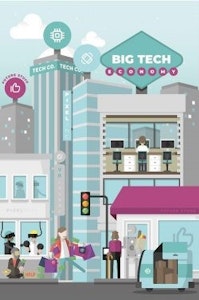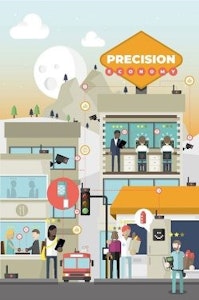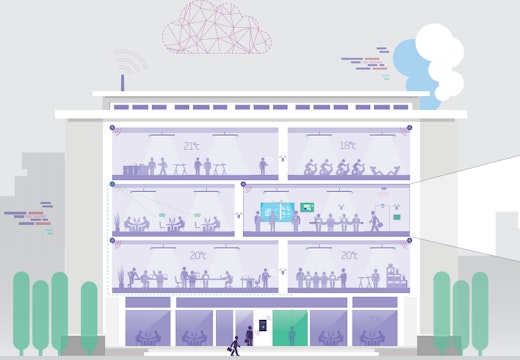London conference explores The Four Futures of Work
As technological change threatens to reorder labour markets around the world, four future-of-work scenarios for 2035 from the RSA's Matthew Taylor provided a curtain-raiser to the WORKTECH London conference 2019
As the UK continues to wrestle with an uncertain economic and trading relationship with the rest of Europe, a report from the RSA’s Future Work Centre has modelled four different scenarios for the future of work in 2035. This study formed the centrepiece of an opening keynote address by RSA Chief Executive Matthew Taylor at the WORKTECH London 2019 conference, 27-28 November 2019.
The RSA team worked in partnership with Arup and used a method called Morphological Analysis (MA) to create a quartet of alternative work futures for Britain with wider meaning and application in different markets around the world.
Each scenario has positive and negative aspects, reflecting increasingly widespread scepticism about what new technologies will bring to the global workplace in terms of rewards, job security and societal gain.
‘Marshall technology for the betterment of workers, minimising drudgery…’
Matthew Taylor is an advisor to the British Government on the rise of the gig economy and is well placed to predict key implications of technological change. As he observes in his introduction to the report: ‘Readers of this report may be tempted to feel despondent about the future. But so much is still to play for. With the right policies and practices in place, we will not just be able to rein in the worst effects of technology, be that job losses or surveillance, but marshal it for the betterment for workers, minimising drudgery and expanding those jobs that bring meaning and fulfilment to our lives.’
The four scenarios are:
The Big Tech Economy
 This describes a world where most technologies develop at a rapid pace, from self-driving cars to additive manufacturing. A new machine age delivers significant improvements in the quality of products and public services, while the cost of everyday goods including transport and energy plummets. However, unemployment and economic insecurity creep upwards, and the spoils of growth are offshored and concentrated in a handful of US and Chinese tech behemoths. The dizzying pace of change takes workers and unions by surprise, leaving them largely incapable of responding.
This describes a world where most technologies develop at a rapid pace, from self-driving cars to additive manufacturing. A new machine age delivers significant improvements in the quality of products and public services, while the cost of everyday goods including transport and energy plummets. However, unemployment and economic insecurity creep upwards, and the spoils of growth are offshored and concentrated in a handful of US and Chinese tech behemoths. The dizzying pace of change takes workers and unions by surprise, leaving them largely incapable of responding.
The Precision Economy
 This portrays a future of hyper surveillance. Technological progress is moderate, but a proliferation of sensors allows firms to create value by capturing and analysing more information on objects, people and the environment. Gig platforms take on more prominence and rating systems become pervasive in the workplace. While some lament these trends as invasive, removing agency from workers and creating overly competitive workplace cultures, others believe they have ushered in a more meritocratic society where effort is more generously rewarded. A hyper connected society also leads to wider positive spill overs, with less waste as fewer resources are left idle.
This portrays a future of hyper surveillance. Technological progress is moderate, but a proliferation of sensors allows firms to create value by capturing and analysing more information on objects, people and the environment. Gig platforms take on more prominence and rating systems become pervasive in the workplace. While some lament these trends as invasive, removing agency from workers and creating overly competitive workplace cultures, others believe they have ushered in a more meritocratic society where effort is more generously rewarded. A hyper connected society also leads to wider positive spill overs, with less waste as fewer resources are left idle.
The Exodus Economy
 This is characterised by an economic slowdown. A crash on the scale of 2008 dries up funding for innovation and keeps the UK trapped in a low skilled, low productivity and low pay paradigm. Faced with another bout of austerity, workers lose faith in the ability of capitalism to improve their lives, and alternative economic models gather interest. Cooperatives and mutuals emerge in large numbers to serve people’s core economic needs in food, energy and banking. While some workers struggle on poverty wages, others discover ways to live more self-sufficiently, including by moving away from urban areas.
This is characterised by an economic slowdown. A crash on the scale of 2008 dries up funding for innovation and keeps the UK trapped in a low skilled, low productivity and low pay paradigm. Faced with another bout of austerity, workers lose faith in the ability of capitalism to improve their lives, and alternative economic models gather interest. Cooperatives and mutuals emerge in large numbers to serve people’s core economic needs in food, energy and banking. While some workers struggle on poverty wages, others discover ways to live more self-sufficiently, including by moving away from urban areas.
The Empathy Economy
 This envisages a future of responsible stewardship. Technology advances at a clip, but so too does public awareness of its dangers. Tech companies self-regulate to stem concerns and work hand in hand with external stakeholders to create new products that work on everyone’s terms. Automation takes places at a modest scale but is carefully managed in partnership with workers and unions. Disposable income, kept aloft by high employment, flows into ‘empathy sectors’ like education, care and entertainment. This trend is broadly welcomed but brings with it a new challenge of emotional labour, defined as managing one’s emotions, even suppressing them, to meet the needs of others.
This envisages a future of responsible stewardship. Technology advances at a clip, but so too does public awareness of its dangers. Tech companies self-regulate to stem concerns and work hand in hand with external stakeholders to create new products that work on everyone’s terms. Automation takes places at a modest scale but is carefully managed in partnership with workers and unions. Disposable income, kept aloft by high employment, flows into ‘empathy sectors’ like education, care and entertainment. This trend is broadly welcomed but brings with it a new challenge of emotional labour, defined as managing one’s emotions, even suppressing them, to meet the needs of others.








